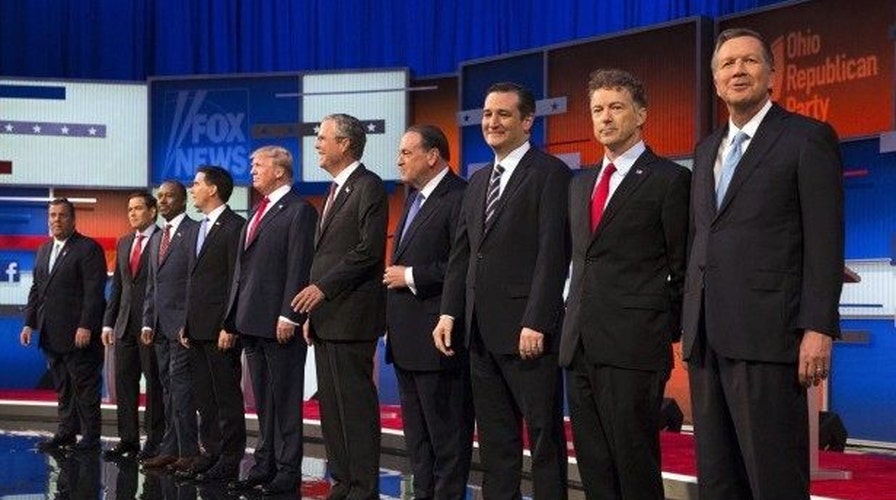FEC Dems' push to punish Fox News for GOP debate made public
Fox News media analyst Howard Kurtz explains controversy over adding undercard contest to first Republican presidential primary debate
Democratic members of the Federal Election Commission, in a decision made public on Thursday, voted last month to punish Fox News over criteria changes for the network’s first Republican presidential primary debate – but were blocked by Republican commissioners.
Commissioner Lee Goodman, one of those who voted to block the move, called the attempt “astonishing.”
“This is nothing short of censorship of news coverage, and it is wrong,” he and the two other GOP commissioners said in a statement.
The vote concerned changes made to the criteria for the Fox News-hosted GOP primary debate on Aug. 6, 2015 in Cleveland. For that debate, Fox News decided to alter the format – hosting two debates instead of one and expanding the first debate for lower-polling candidates to include any candidate identified as such in national polls. Seven candidates ultimately participated in the first debate, and 10 participated in the prime-time event.
A complaint subsequently was filed with the FEC by candidate Mark Everson – who was not in the debate – claiming those changes were tantamount to an illegal corporate contribution to the candidates on stage.
After consideration, two Democratic commissioners – Ann Ravel and Steven Walther – concluded the network had made such an illegal contribution to the seven candidates invited to the first debate and voted to penalize. The vote failed 2-4. The other Democratic commissioner, Ellen Weintraub, did not vote to penalize Fox News and voted to dismiss.
Separately, when given the chance to conclude there was “no reason” to believe Fox News violated the law, the commission split 3-3, along party lines. Because any enforcement action requires four votes, the case was closed.
Though Republican members criticized all three Democrats for their votes, Weintraub stressed in a written statement that she voted “no” when asked whether Fox News broke the law. She said the network was “confronted with a difficult and fast-moving situation, and I believe they were trying to do the right thing.”
However, in an apparent swipe at Goodman, she said efforts “exaggerating disagreement among Commissioners” are “unhelpful.”
The Republican commissioners, though, said the Democrats went too far.
While political debate rules have come before the FEC in the past, rarely has the commission come so close to penalizing a news outlet over the issue.
The commission in 2002 dismissed a complaint about debate rules that had been lodged against the Boston Globe and WBZ-TV. And years earlier, in 1980, the commission threatened an injunction against the Nashua Telegraph over a planned debate between George H.W. Bush and Ronald Reagan that excluded other candidates. Reagan then stepped in to pay the costs – and during that debate, famously said, “I am paying for this microphone.”
Until recently, the FEC had steered clear of threatening action over press-sponsored debates.
Goodman argued that such “editorial decisions” regarding debate rules should be free from FEC regulation. He suggested there is “no practical or logical difference” between hosting a debate with 17 candidates and interviewing 17 candidates.
“How could expanding debate news coverage from 10 to 17 candidates be against the law?” he said.






















